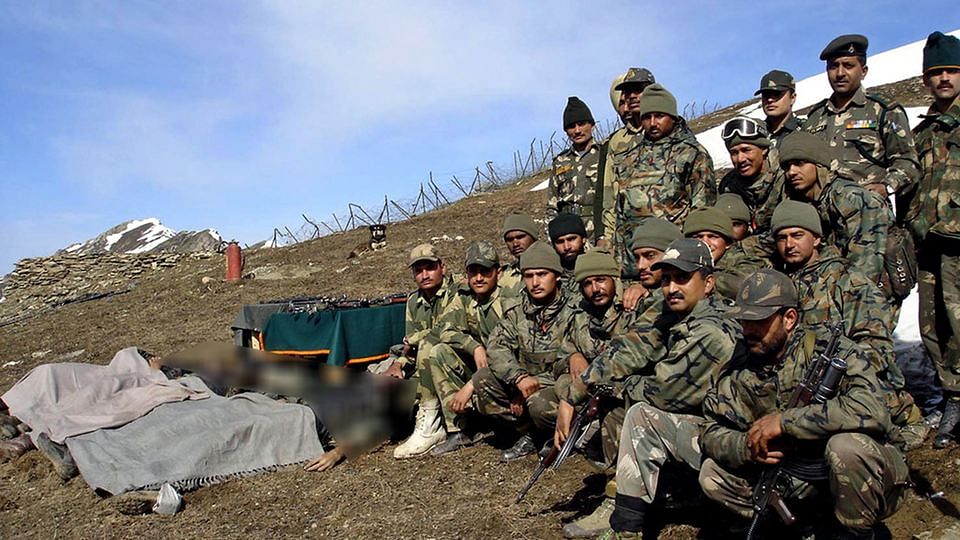Machil Verdict: A Strong Message by Army Against Errant Behaviour
Verdict in the Machil encounter case has sent the right message to the people of Jammu and Kashmir and to the army

Army Indicts Its Own
- Verdict in the Machil encounter case has sent the right message to the people of Jammu and Kashmir and to the army
- A sense of closure for the people of J&K caught in the warp of agitation and militancy in the past
- Army has emphasised the policy that deliberate actions designed to seek personal gains would not be tolerated
- Pathribal case could not be pursued to the stage of conducting a Court Martial due to insufficient evidence
- AFSPA, an enabling Act that gives the army necessary powers to conduct counter-insurgency operations efficiently
The swift confirmation of the sentence of life imprisonment awarded by a Summary General Court Martial to six army personnel involved in planning and executing a fake encounter in the Machil sector of northern Kashmir, by Lt Gen D S Hooda, GOC-in-C, Northern Command, has sent the right message to the people of Jammu and Kashmir and to the troops he commands.
Of the two officers who have been convicted, one is of the rank of Colonel and was the Commanding Officer of the battalion concerned. All the personnel have been dismissed from service and will now go to jail to serve their sentences.
Sense of Closure
For the people of J&K this will bring closure to the episode that had eventually led to a long-drawn confrontation between Kashmiri youth and the security forces in which 123 people lost their lives. The stone-throwers’ agitation had alienated the Kashmiri people just when the tide of militancy had begun to turn and had provided the separatist leaders an opportunity that they could exploit.
The message for the army personnel in Northern Command and elsewhere in the country is that aberrant behaviour for the sake of medals or other honours will not be tolerated. The army makes a clear distinction between errors of judgement and errors of intent. While the army leadership may tolerate genuine mistakes made in the course of duty, deliberate actions designed to seek personal gains are never tolerated. This policy has once again been emphasised and reinforced.
Comparison with Pathribal is Unfair
Negative comparisons have been made with the Pathribal incident of 2000 in which no prosecutions have occurred so far. It is not realised that the reason for this is the lack of sufficient evidence to proceed against the accused personnel. A Summary of Evidence was recorded and over 50 witnesses were examined. The case could not be pursued to the stage of conducting a Court Martial due to insufficient evidence. In fact, the Machil case should reassure concerned citizens that the army never spares errant personnel.
Of all the threats and challenges that a modern army is called upon to address, counter-insurgency operations are by far the most complex and the most difficult operations to conduct. There is no ‘enemy’ as the overall aim is to bring alienated, or disaffected, or misguided youth back into the national mainstream so that the problems perceived by them can be addressed through negotiations. Operations are undertaken with minimum force – with one hand tied behind the back, the militant or insurgent can appear from virtually anywhere, he can choose the time and place of attack and then melt into the people.
Need to Empathise with the Army
Counter-insurgency operations place the troops under immense stress and require the highest levels of training, motivation and junior leadership. Success is extremely difficult to achieve and is almost completely dependent on real-time ‘actionable’ intelligence – which is rather difficult to obtain.
Under the circumstances, the Indian army has done remarkably well over a period of five decades of employment for internal security, first in the north-east, then in Punjab and since 1989-90 in J&K. The army has evolved egalitarian tactics, techniques and procedures that are the envy of many Western armies. It has succeeded in stabilising the security situation to enable routine administrative activities to be conducted on a near-normal basis. In fact, at many places where the civil administration finds it difficult to reach, the army has been undertaking socio-economic development under Operation Sadbhavana.
Why is AFSPA Needed?
While there have been some aberrations like the Machil fake encounter, there has been no gross error of judgement. The Indian army has never been involved in a massacre like that at My Lai in Vietnam in 1968 in which almost 500 innocent civilians were killed in cold blood and the entire village was razed to the ground. The army has never had a prison like Abu Gharaib or a detention-without-trial facility like the one at Guantanamo Bay.
After the Machil judgement came in, human rights organisations once again began to raise their voice against the continuation of the Armed Forces Special Powers Act (AFSPA). AFSPA is an enabling Act that gives the army the powers necessary to conduct counter-insurgency operations efficiently. The Act provides its personnel with constitutional safeguards against malicious, vindictive and frivolous prosecution, which are available to the police forces under the Indian Penal Code. If AFSPA is repealed or diluted, the performance of the army’s battalions in counter-insurgency operations will be adversely affected and the terrorists or insurgents will seize the initiative.
(The writer is former Director, Centre for Land Warfare Studies (CLAWS), New Delhi)
(At The Quint, we are answerable only to our audience. Play an active role in shaping our journalism by becoming a member. Because the truth is worth it.)